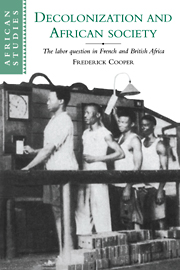Book contents
- Frontmatter
- Contents
- List of tables and figure
- Preface
- List of abbreviations
- Map of French and British colonial Africa
- 1 Introduction
- Part I The dangers of expansion and the dilemmas of reform
- Part II Imperial fantasies and colonial crises
- Part III The imagining of a working class
- Part IV Devolving power and abdicating responsibility
- Conclusion
- Notes
- Bibliography
- Index
- OTHER BOOKS IN THE SERIES
1 - Introduction
Published online by Cambridge University Press: 22 February 2010
- Frontmatter
- Contents
- List of tables and figure
- Preface
- List of abbreviations
- Map of French and British colonial Africa
- 1 Introduction
- Part I The dangers of expansion and the dilemmas of reform
- Part II Imperial fantasies and colonial crises
- Part III The imagining of a working class
- Part IV Devolving power and abdicating responsibility
- Conclusion
- Notes
- Bibliography
- Index
- OTHER BOOKS IN THE SERIES
Summary
“Everything is permitted, but nothing is possible”
Graffito, seen on a Parisian wall, fall 1984The era of decolonization was a time when the range of political possibilities seemed to open up, only to close down again. When Ghana became an independent state in 1957, followed by Guinea in 1958 and others in the ensuing decade, Africans could, in theory, organize their governments as they wished and use them to transform their lives. Leaders – western educated, but rarely more than one generation removed from their milieux of origin – saw themselves as choosing the best of what Europe and Africa had to offer. A wide populace participated in the sense of triumph which attended the transition. In the new Africa, much was permitted, and something was possible. Yet within a decade or so, African writers were portraying societies disillusioned with the fruits of independence, with power-hungry leaders who sought to neutralize the social movements which had once helped them to challenge colonial rule, with the indifference of civil servants to the problems of ordinary people, with elite cultures overly focused on the West. Were new states and new political and social organizations finding themselves constrained by the paths they took toward political independence just as they had been by the structures of colonial rule?
This book is about the changing definition of the possible in the era leading up to decolonization. It focuses on the intersection of French and British colonial bureaucracies with African labor movements and the way in which their conflict and connection both expanded and limited the labor question.
- Type
- Chapter
- Information
- Decolonization and African SocietyThe Labor Question in French and British Africa, pp. 1 - 20Publisher: Cambridge University PressPrint publication year: 1996

